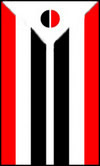Lesson
Seven - Part One
Addressing People
The lyrics of the Northern Arapaho Flag Song are given below. Notice that they begin with an address to "my relatives," followed by a command to those people to do something. The verb used is the TI verb noohoot- 'see something' and because all the relatives are being addressed, the plural imperative or command form is used ending in -owu'.
| neito'eino' hii-noohoot-owu' | My relatives, look at it, |
| he-niiwohoen-in hono'-u' | Our flag up in the sky. |
| honouute', nonoh'oobeese-' | It is hanging there, blowing in the breeze. |
Vocatives
The vocative is the term for how to address someone. Normally, just the regular noun is used, as in the example of "my relatives" above. But for very common people who are addressed, there is a special vocative form. It is formed by a suffix added to the noun. This suffix for common animals is -n. Therefore, you would say heneecéé-n "Buffalo!" and wóxuu-n "Bear!" With kinship terms, a form -óó is often used, usually with shortening or sometimes with a lengthening of the noun stem. So you would say: neix-óó "My father!" and notóó "My daughter!" In other cases, the vocative is simply an abbreviation of the word. For example, neíh'e 'my son' becomes neí in the vocative.
Common, useful vocatives are:
| father! | |
| mother! | |
| son! | |
| daughter! | |
| grandfather! | |
| grandmother! | |
| aunt! | |
| uncle! |

